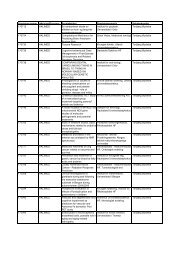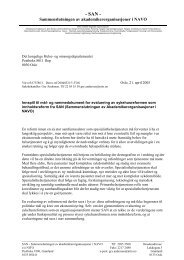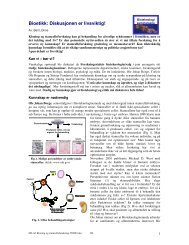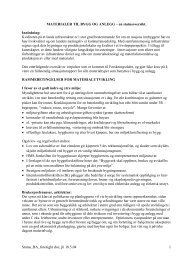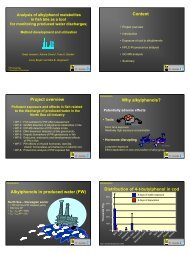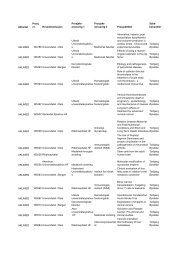A Revolution in R&D
A Revolution in R&D
A Revolution in R&D
You also want an ePaper? Increase the reach of your titles
YUMPU automatically turns print PDFs into web optimized ePapers that Google loves.
Chapter 1: The Impact of Genomics<br />
Preface<br />
As the science of genomics has advanced, so has the<br />
def<strong>in</strong>ition. When the term was co<strong>in</strong>ed <strong>in</strong> 1986, it<br />
referred ma<strong>in</strong>ly to the study of the mammalian<br />
genome—specifically, the mapp<strong>in</strong>g, sequenc<strong>in</strong>g,<br />
and analyz<strong>in</strong>g of all its genes. The scope soon<br />
expanded, focus<strong>in</strong>g not just on the genes’ structure<br />
but on their function as well. More recently, the<br />
scope of the term has broadened further, focus<strong>in</strong>g<br />
no longer just on knowledge of the genome but also<br />
on the exploitation of that knowledge, especially<br />
for health care.<br />
Go<strong>in</strong>g beyond dictionary def<strong>in</strong>itions, our <strong>in</strong>terest is<br />
<strong>in</strong> what genomics means for the economics of pharmaceutical<br />
R&D. On the basis of our extensive<br />
research and many discussions with prom<strong>in</strong>ent people<br />
throughout the <strong>in</strong>dustry, we suggest characteriz<strong>in</strong>g<br />
genomics, for the purposes of this study, as the<br />
confluence of two <strong>in</strong>terdependent trends that are<br />
fundamentally chang<strong>in</strong>g the way R&D is conducted:<br />
<strong>in</strong>dustrialization (creat<strong>in</strong>g vastly higher throughputs,<br />
and hence a huge <strong>in</strong>crease <strong>in</strong> data), and <strong>in</strong>formatics<br />
(computerized techniques for manag<strong>in</strong>g and<br />
analyz<strong>in</strong>g those data). The surge of data—generated<br />
by the former, and processed by the latter—is<br />
of a different order from the data yields of the pregenomics<br />
era.<br />
To elaborate. The new high-tech <strong>in</strong>dustrialization<br />
has <strong>in</strong>creased the efficiency of certa<strong>in</strong> activities<br />
beyond recognition. Instead of assign<strong>in</strong>g <strong>in</strong>dividual<br />
scientists to work manually on modest <strong>in</strong>dividual<br />
experiments, companies now <strong>in</strong>voke automation<br />
and parallel process<strong>in</strong>g to conduct experiments<br />
much larger <strong>in</strong> scale and complexity, and at a much<br />
faster pace.<br />
Look around this lab—you have to search high<br />
and low to f<strong>in</strong>d a human heartbeat. Now robots<br />
can do the menial th<strong>in</strong>gs we did <strong>in</strong> grad school.<br />
—Research leader,<br />
lead<strong>in</strong>g biotech company<br />
The data that emerge are immensely greater both<br />
<strong>in</strong> quantity and <strong>in</strong> richness. Enormous databases—<br />
detail<strong>in</strong>g gene expression, for example, or homologous<br />
genes across species, or prote<strong>in</strong> structures—<br />
afford unprecedented comprehensive views of<br />
biological processes. Increas<strong>in</strong>gly, researchers can<br />
understand properties of the system rather than<br />
just <strong>in</strong>dividual parts, and that holds out the promise<br />
of a more rational approach to drug discovery.<br />
The new technology of <strong>in</strong>formatics serves to handle<br />
and process all these data. Without it, the data<br />
would rema<strong>in</strong> raw material. Informatics was nurtured<br />
by several co<strong>in</strong>cid<strong>in</strong>g factors: the ever-accelerat<strong>in</strong>g<br />
power of computers, ref<strong>in</strong>ed algorithms, the<br />
<strong>in</strong>tegration of data and technology platforms, and<br />
the versatility of the Internet. The effect is that<br />
overwhelm<strong>in</strong>g masses of <strong>in</strong>formation can now be<br />
marshaled, managed, and analyzed as never before.<br />
Data are transformed <strong>in</strong>to knowledge.<br />
We could never have achieved drug development<br />
that fast with traditional techniques. No way—<br />
without the computers we didn’t have a chance.<br />
—VP of chemistry,<br />
biotech company<br />
11



